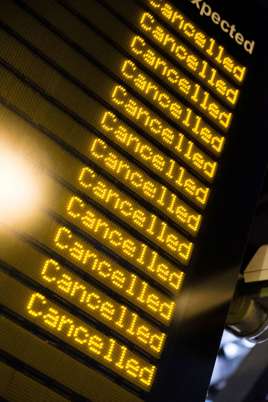Every week now, there is a significant infrastructure failure. On the Great Western, it happens most days.
There is a growing perception that the railway is less dependable than before.
The promise that buying a ticket will ensure you reach your destination is not always binding.
Often that is incorrect. But perception matters: it influences travelling choices.
Rail remains the safest form of travel in the UK, and it is still one of the most reliable.
It would be daft to arrive at circumstances in which travellers feel they should take a less safe but more dependable alternative - especially when that alternative is more damaging to the environment.
Yet that is happening. In January, ScotRail cancelled all trains in advance of Storm Isha and Storm Jocelyn, running no services in the morning peak twice in a week - including in the Central Belt commuter region.
In England, Network Rail imposed a blanket 50mph speed limit, affecting the Sea Wall at Dawlish and south London suburban services in equal measure.
Roads remained open.
So did airports.
Buses, coaches, trams and taxis all ran.
Trains did not… or were heavily disrupted.
Is the railway too risk-averse? Too quick to suspend services? Or is this good safety management of the ageing cost-constrained infrastructure?
We could call it the “Carmont effect” - a response to the most recent fatal train crash on our railway, in which failure to react adequately to severe weather played a large part.
In this issue, we examine the threat to rail’s dependability from many angles.
Network Rail Safety Director Martin Frobisher tells us the industry has become too risk averse.
He sets out a data-driven strategy to achieve a better balance between the need to keep people safe and the need to deliver passengers and freight owners the services for which they have paid.
A trial of a new risk model is under way in the North West.
“I think it’s brilliant,” says Frobisher.
“Our goal is to roll this out.”
For the passenger train operators, Rail Partners’ Andy Bagnall makes the case against blanket speed restrictions in favour of a more nuanced approach.
“We have to ensure the railway serves its purpose,” he argues.
And ASLEF General Secretary Mick Whelan points out that aversion to unnecessary risk is a good thing for his members.
We take a deep dive into infrastructure maintenance.
The team instigating a recovery programme on the poorly performing Reading to Paddington route sets out its plans to restore reliability.
And we assess the bigger picture: running a dependable service in a changing climate - in particular more intense rainfall, the effects of which are already being felt in Scotland.
Read on: because these are the big issues that will dominate railway thinking for decades to come.
We look too at the Government’s latest ideas for restructuring the way the railway is led. But whatever politicians do or don’t do after the General Election, whatever administration they dream up to run the railway, the industry cannot wait while Westminster dithers, dodges and delays.













